Tid(y)Up - The Floating Exhibition reaches the Black Sea
11-10-2022
All across the world, the production and distribution of thermoplastic polymers - commonly known as plastics - are multimillion dollar industries that provide employment and livelihood for many. Recollection and recycling of plastic on the other hand, is way behind production, leaving natural waters like rivers and oceans more and more polluted. But being less lucrative does not mean that a business is hopeless. Field report on the international tour of FLEX from Varna, Bulgaria.
The awareness raising exhibition of Tid(y)Up is built around a very simple idea. To stop the plastic flood on rivers, we have to educate the youngest of generations. To fully comprehend the applicability as well as the risks of plastics is a long and difficult process even for an adult, not to mention kids. Well, not for FLEX. The acronym stands for Floating Exhibition: a versatile, modular, zerowaste exhibition about the formation, the behavior, collection and recycling of riverine litter. Approximately 80% of marine and riverine litter is made out of plastics, mostly single use products. To stop them from entering natural waters a shift is needed in the attitude of the general public, the sooner the better. But how to achieve such a big shift if people cannot distinguish between the most important types of plastics?
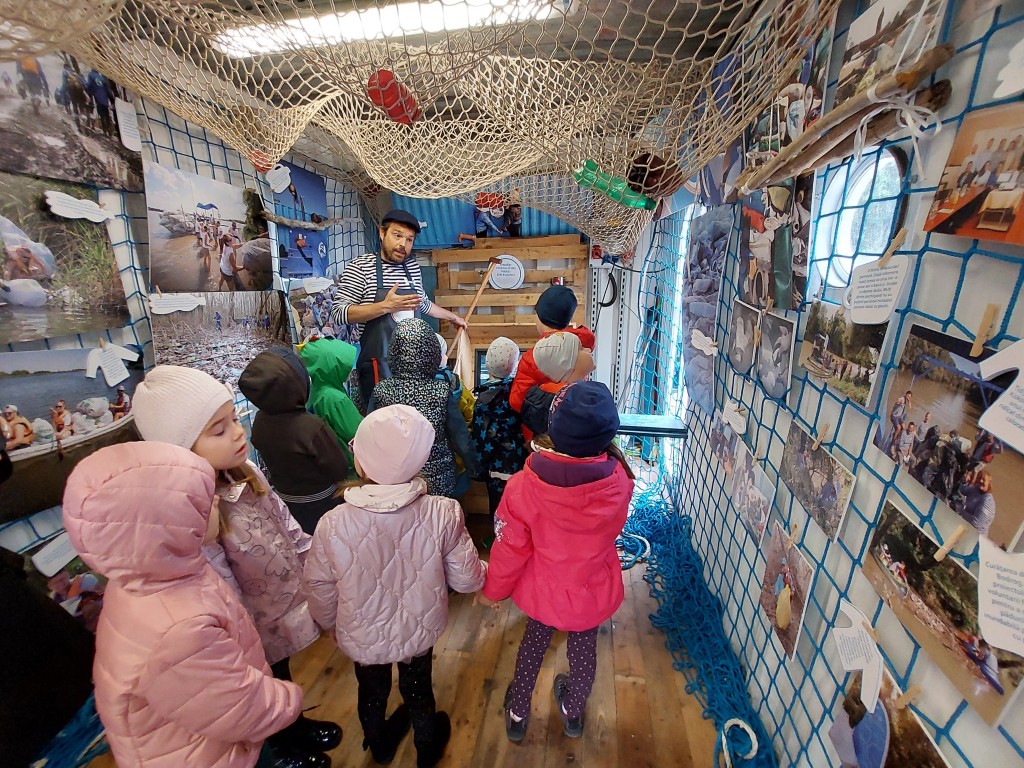
Welcoming small kids from a kindergarden onboard FLEX (photo by Szabolcs Fülöp)
- For many millennia our very survival depended on wood. No wonder that we developed an intimate knowledge on all kinds of trees, even the smallest of kids can tell apart and oak from a pine - says Attila David Molnar, curator of the FLEX. - Now that knowledge is completely absent when it comes to plastics.
Talking about survival, soon we will have as much plastic in the seas as fish, so its time for all of us to get to know more about ethylene and propylene, at least. Onboard FLEX, kids are introduced to the most important types of plastics without really noticing it. It all starts as a little investigation, with kids enthusiastically searching for small icons - numerical codes - in recycle signs on the bottom of plastic bottles and flasks. Once they find it, they shout out loud.
- No matter which country we visit, the effect on kids is the same. They get very excited. Some of them tell us confidentially that this is the best program they have ever attended. - says Katalin Veszity, the chief animator of FLEX with a smile. - Feedbacks like this keeps us doing the job.
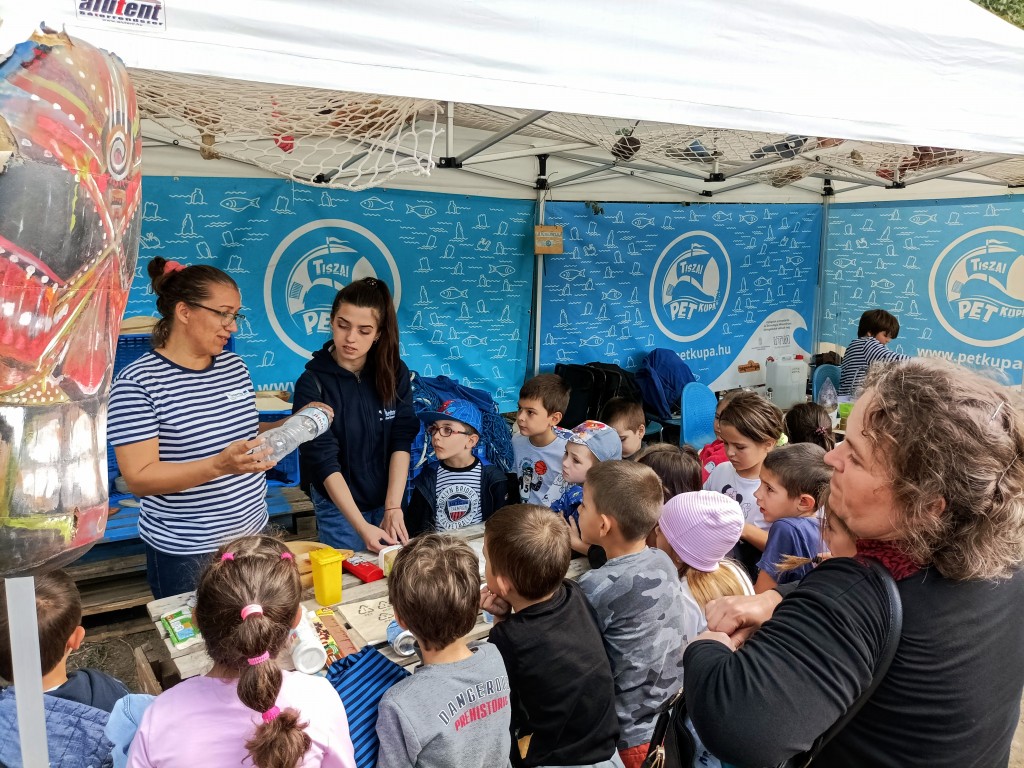
Animators of FLEX surrounded by young schoolchildren explain the basics of 'plasticology'.
Going from country to country with hundreds of visitors each day is a challenge in itself especially for the FLEX crew, who do not turn down a group just because they failed to register. After a short 2021 test run with one module in Serbia, Novi Sad, the international FLEX tour visited Slovakia, Romania and Bulgaria in 2022. In this 360 VR video you can get a glimpse into the way children are involved in creative plastic recycling onboard the FLEX.
After getting to know plastics better, kids are invited to an interactive workshop called the River Trashlab. Within just a few minutes they grind, shred, melt selective plastic waste and turn them into useful artifacts. This time just a couple of meters away from the Black Sea, in the picturesque city of Varna, Bulgaria. Shortly after the opening ceremony, 150 kids queue around the containers. 4 animators, 2 trainers and 2 schoolkids - hosts of the River Trashlab - welcome them.
- Onboard the FLEX our visitors see with their own eyes how single used plastics (SUPs) turn into something that holds a practical value for years if not decades - comments Violin Raykov, researcher of the Institute of Oceanography, host of the Varna visit - a flower pot, a pen, a liner or a bracelet is not only a nice object to possess. It is also a memento that the time of SUPs must be over. Marine ecosystems, like the Black Sea, cannot be treated as waste dumps any longer.
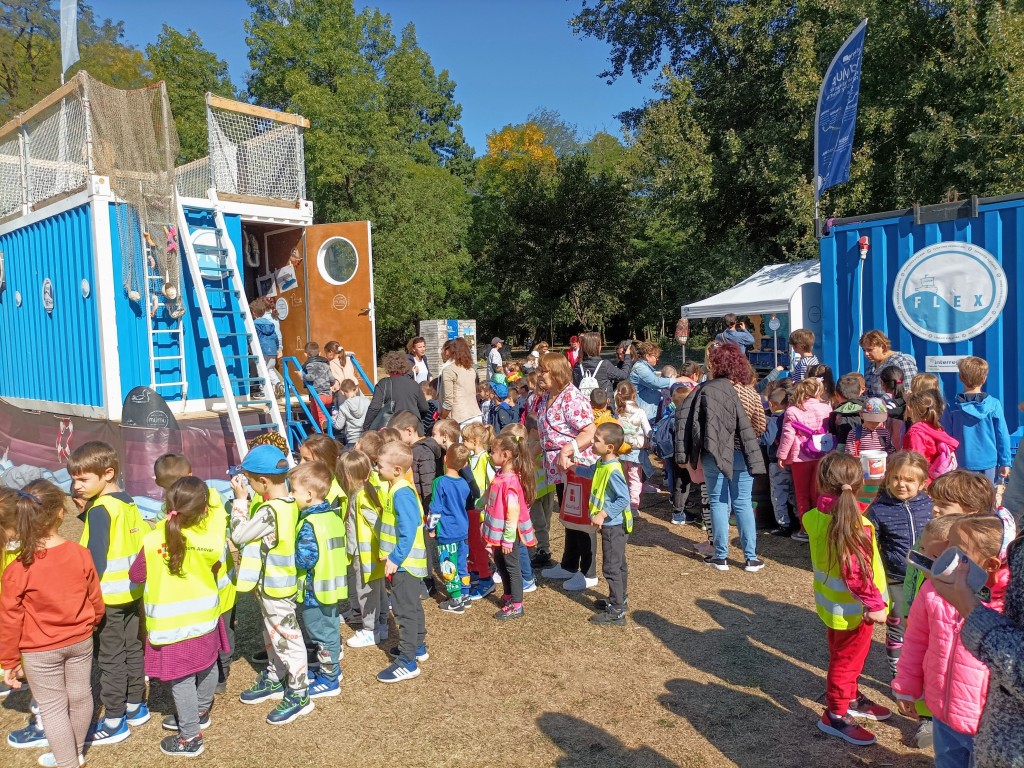
In Varna, Bulgaria FLEX attracted record number of visitors.
The hidden connection between plastic packaging, waste management problems and river pollution comes to the light inside a large recycled marine container, featuring dozens of large photo prints. Shocking images show how plastic floods affect European rivers such as the Danube. Torn, flattened plastic bottles built into the sediment. Enormous plastic jams several hectares in size in front of a hydroelectric power plant. Transnational riverine litter pollution have a fundamental effect on the quality of running freshwaters and it is closely related to how we use precious resources like plastics or fresh water, for that matter. Next to the reclaimed container a big yellow submarine wait the visitors, inside its rectanglable arms a fishing net full of plastic debris.
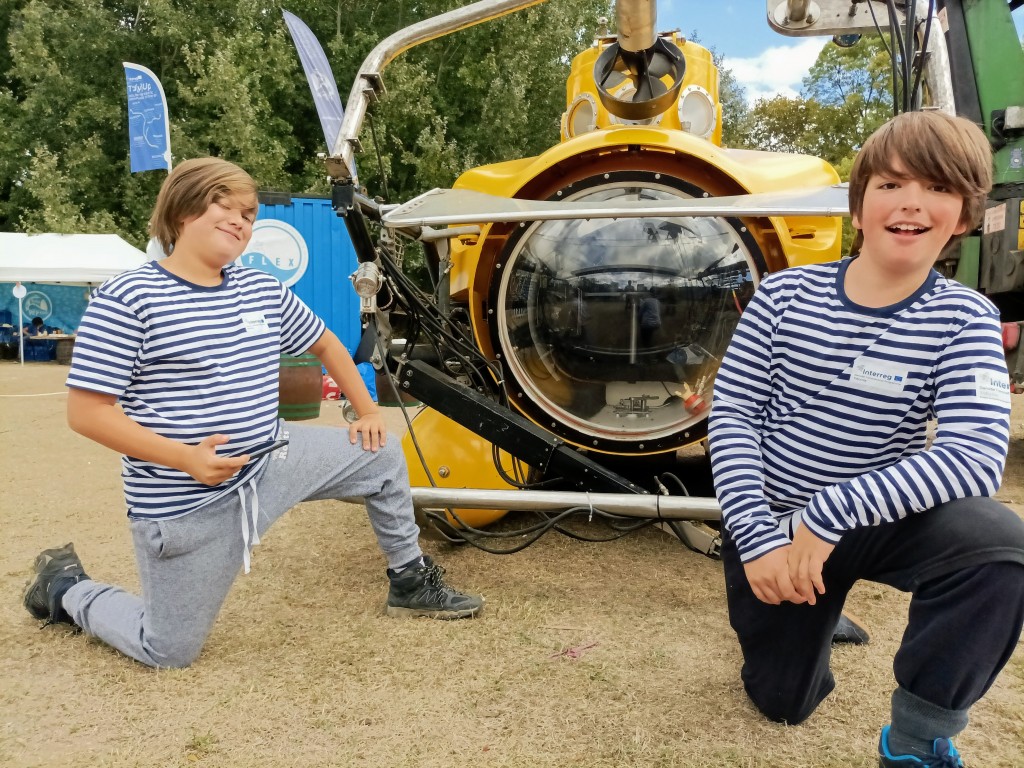
The FLEX was invited to Varna by IO-BAS, who contributed to the exhibiton with a real yellow submarine, with which animators are happy to pose with.
- As part of IO-BAS outreach efforts we decided to bring out the submarine of the institute not only for demonstration, but to invite more kids to start to get involved in science and in the exploration of the seas - adds Dimitar Dimitrov, scientists of FLEX's host IO-BAS. - We also made sure that the visitors are provided with interesting books to read, not only about rivers and oceans, but also about plastic pollution.
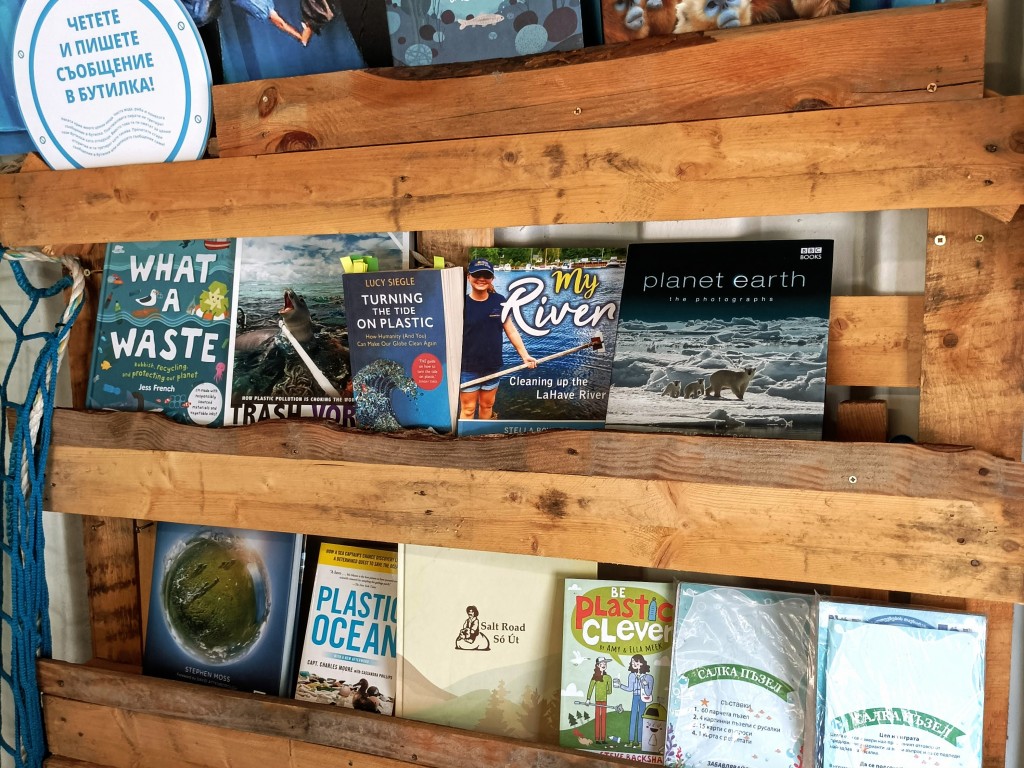
The FLEX library have a unique collection of books related to rivers, oceans and plastic pollution.
The exhibition arrived to the shore of the Black Sea from Romania, where the containers 'anchored' in Satu Mare - hosted by TidyUp partner MULTISALVA - for 4 days before proceeding to Varna. In every corner of the exhibition, the nice logo of FLEX catches the eye. In all project languages of the Tid(y)Up project it tells that this is not only flexible but also a 'Floating' exhibition. The exhibitions commissioner, the Hungarian Association of Environmental Enterprises (HAEE) is putting the acronym in context for us.
- Our core idea is that a zerowaste exhibition has to be modular and transportable not only on the road but also on the river. For that we purchased an unused old ferry to receive the container based exhibition onboard - tells Gergely Hankó, managing director of HAEE. - However, in the post COVID era with prices 3-4 much higher than at the time of the application, we had to accomplish most of the FLEX missions on the road. But we did not give up the original concept.
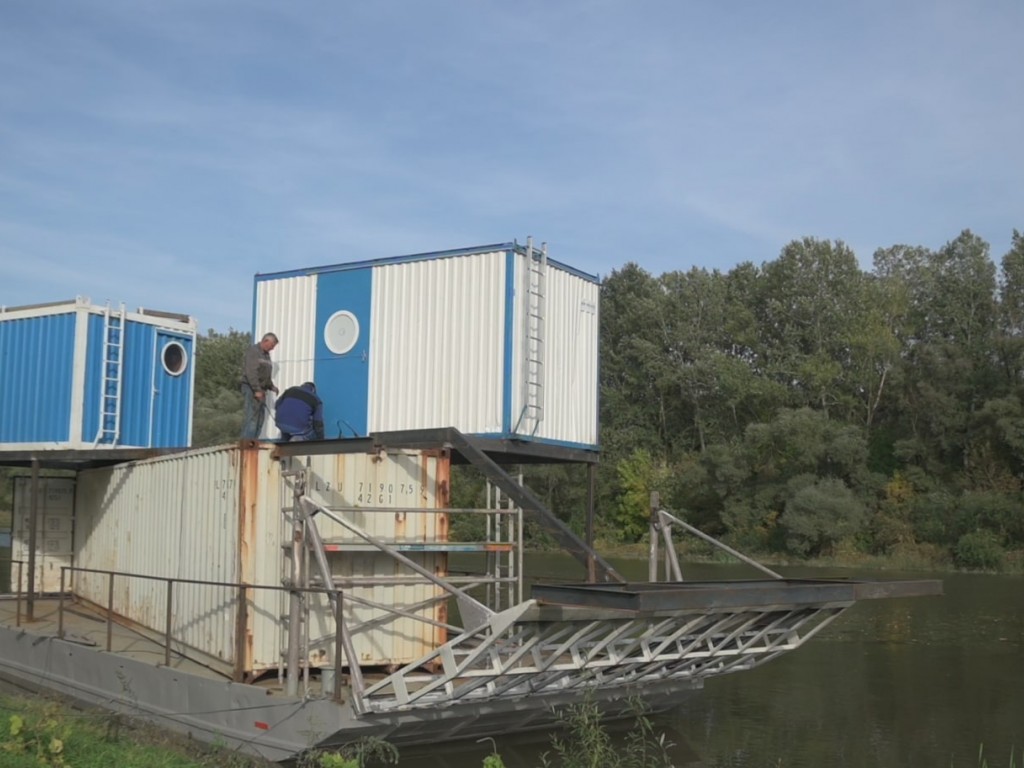
The containers of FLEX getting onboard a refurbished old ferry.
When writing this, preparations are well underway to put the old decommissioned ferry back in service. But this time, not as a ferry, but as an exhibition, that is literally, floating. If everything turns out as expected, the FLEX will sail the waters of the Tisza river by the time of the Tid(y)Up project's closing ceremony, scheduled for November, 2022. Should you be interested in the public conference, please do not forget to register HERE.
written by Anna Istenes
photographs by Attila D. Molnár, Szabolcs Fülöp, Violin Raykov
